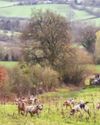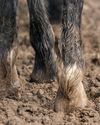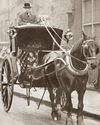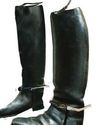What is the Rare Breeds Survival Trust doing to combat the decline in numbers of those breeds on its watchlist? Stephanie Bateman finds out.

PICTURE a Britain without Dartmoor, Exmoor or Highland ponies, and it’s eerily empty. It is these breeds — plus the others on the Rare Breeds Survival Trust’s (RBST) watchlist — that we have grown up with and learnt to ride on, and that make up the fabric of equestrianism in this country. But the risks of losing them go beyond the sentimental factor.
“If we allow a breed to become extinct, we risk losing unique genetic traits such as disease resistance and climatic adaptations,” says the trust’s CEO Tom Beeston. “These traits could be essential for the survival of future generations.”
Simply maintaining a breed at low numbers is also a risky strategy.
“Small populations can lead to inbreeding. To survive, breeds need effective populations of breeding, pedigree, registered animals,” he adds.
“Geographically constrained populations, such as the New Forest and Exmoor ponies, also pose a risk — if a disease were to take hold over one of these groups confined to a small area, the results could be catastrophic.”
Traditional native and heavy horse breeds rate highly on the RSBT’s watchlist (see box, p33), but most still have a key role to play in the modern world.
“Native breeds graze more selectively, helping to form a mosaic of habitats, and significantly increasing biodiversity,” Tom explains. “This skill has developed over generations of genetic adaptation and it would be impossible to recreate these skills if a breed was lost to extinction.”
Other breeds have had to adapt to different uses to find a place in today’s society.
“The Clydesdale was originally used for agriculture, but is now growing in popularity in riding schools, as it can cope with the demand from bigger riders.
この記事は Horse & Hound の February 16 2017 版に掲載されています。
7 日間の Magzter GOLD 無料トライアルを開始して、何千もの厳選されたプレミアム ストーリー、9,000 以上の雑誌や新聞にアクセスしてください。
すでに購読者です ? サインイン
この記事は Horse & Hound の February 16 2017 版に掲載されています。
7 日間の Magzter GOLD 無料トライアルを開始して、何千もの厳選されたプレミアム ストーリー、9,000 以上の雑誌や新聞にアクセスしてください。
すでに購読者です? サインイン

Gemirande provides 24-carat magic
Venetia Williams sparkles again in the December Gold Cup and jockey brothers dead-heat

‘Happy hunting, everyone'
“The season for talks, dinners and parties has finally arrived for Tessa Waugh, whose distress about the snags of middle age fades away with some rousing festive spirits

'Monaco deserved this victory
Seemingly destined always to play the bridesmaid’s role, Harrie Smolders’ great partner Monaco finally tops an incidentpacked Rolex grand prix

'It had to end sometime'
The closure of beloved Hampshire saddlery Calcutt Sons is a loss to the hunting and wider equestrian worlds, as Octavia Pollock reports

'You couldn't want for more
The Ludlow's peaceful country makes for a day in \"hunting paradise\"

The greatest gift of all
Christmas is fast approaching and while we all like a bit of tinsel, the festive season is also a perfect time for giving to a horse charity. Niki Hinman finds out some of the options

Winter him well
A horse's winter routine can differ dramatically from his summer structure but what’s the knock-on effect? Ellie Hughes asks vets how to optimise routine management for the season

Neat feet
Excellent hoof care is a year-round concern but the winter months present their own problems. Richard Stephenson MRCVS explains the seasonal challenges afoot and how to stay one step ahead

In bygone days
Modern vets have much scientific knowledge behind them, but what about their forebears? Kieran O’Brien MRCVS opens up the world of Victorian vets in London

'When I joined the Pony Club it was just two boys and 48 girls'
Pepsi Kohler on being delightfully outnumbered by girls in the Pony Club, a leg-up from a royal and the H&H advert that changed his life